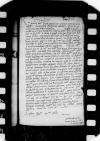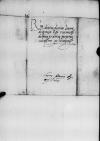Letter #2707
Paweł DUNIN-WOLSKI to Ioannes DANTISCUSOlita, 1544-02-29
| received Heilsberg (Lidzbark Warmiński), 1544-03-28 Manuscript sources:
| ||||
Text & apparatus & commentary Plain text Text & commentary Text & apparatus
Reverendissimo Domino, domino
Reverendissime Domine, domine praesul amplissime et amice perpetuo honorandissime.
Commendata officiosissima voluntate Reverendissimam Dominationem Vestram plurima salute impartior.
Cum is dominus
Imprimis autem nuntio Reverendissimae Dominationi Vestrae serenissimum dominum
Ceterum novarum rerum hic plane habemus nihil, quorum Reverendissimae Dominationi Vestrae copiam facere praestitisset, cum optime norit omnia, quibus necesse esset in tam perdito et miserrimo toties afflictae reipublicae Christianae atque iam plane tot bellis et principum Christianorum dissidio perditae tempore.
Ex
Interim autem me et obsequia mea Reverendissimae Dominationi Vestrae quam diligentissime commendo. Cui Deus Omnipotens optatam valetudinem in plurimos annos tribuat ac optatissimis successibus semper adaugeat tueaturque.
Datae
ex
Eiusdem Reverendissimae Dominationis Vestrae servitor

